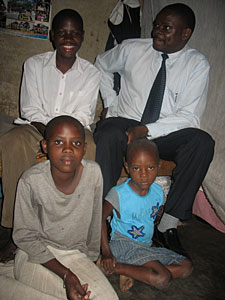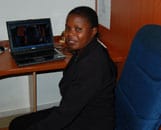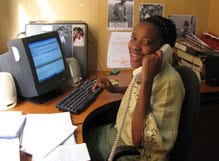Inside Uganda With Dr. Yona Kapere
If you’ve been following our 15 Christian bloggers on their trip to Uganda you’ve seen only a glimpse of what it’s like to live in extreme poverty. It’s an outside view of Compassion’s ministry.
Today we present part three in a series of blog posts from staffers of Compassion Uganda who will give you an inside look into how Compassion’s ministry operates among the poorest of the poor.
Have you ever wondered who cares for the medical needs of children registered with Compassion? Especially those living in rural communities with no doctors or hospitals?
Each Compassion center has, as part of its staff, a health specialist. This person provides medical guidance for each child registered in the program and arranges for doctors’ visits, immunizations and preventive care.

Dr. Yona Kapere is the Senior Health Specialist for Uganda. Here, he shares his role within Compassion and the success he has seen.
As a health specialist, I am involved mainly in equipping the church partner staff to ensure that the supported children choose good health practices and are physically healthy. We mainly achieve the above through networking with other existing service providers.
We use field reports and monitoring visits to identify disease trends, gaps and challenges at the implementation level, and support the field to make a difference in the lives of the most vulnerable children.
The most energizing bit of my work is that I have the opportunity to witness the difference our interventions are making in the lives of children and caregivers.
During one of our project monitoring visits, we came across an adolescent who had given up on life because he was HIV-positive. But with the support from Compassion through the church partner, the life of this adolescent was restored and he is currently feeling much better because of the medicine we are able to provide for him.
He is attending school and educating his peers on HIV/AIDS.
This youth had this to say:
“I had given up on life because no one seemed to understand me, but with the support of the church staff I was taken through counseling, and I have hope that I will leave to complete my studies and become an engineer.”
To those who support us to implement these programs, thank you for restoring hope to the hopeless. Many are alive and will continue to live because of your support.
Continue Reading ›Inside Uganda With Patience Musiime
If you’ve been following our 15 Christian bloggers on their trip to Uganda you’ve seen only a glimpse of what it’s like to live in extreme poverty. It’s an outside view of Compassion’s ministry.
Today we present part two in a series of blog posts from staffers of Compassion Uganda who will give you an inside look into how Compassion’s ministry operates among the poorest of the poor.
The Child Survival Program (CSP) serves caregivers, infants and toddlers in some of the world’s poorest communities. Caregivers enrolled in CSP are visited each week by dedicated staff, whose passion is to bring health and healing to homes affected by poverty. Patience Musiime, a CSP specialist in Uganda, shares her favorite stories of hope from the Child Survival Program.
In 2004, Uganda opened our first Child Survival Program. At the Bugongi CSP, we have seen so much happen in just four years. In the Bugongi CSP, all of our 20 pregnant mothers have given birth to bouncing, healthy babies. This is a miracle! In Uganda, 200,000 children under the age of 5 die every year. But the babies in CSP are living!
In Uganda’s CSPs, we first understand that a mother must be healthy if she is to take care of her children. So we make sure our mothers go to a licensed health care center for their medical care, both before and after the baby is born. Since hundreds of thousands of mothers and children in Uganda are infected with AIDS, we also make sure to teach our mothers about protecting themselves and their families from this disease. For mothers who have HIV, we arrange medical care and teach them income-generating activities. But CSP is not just about caring for a family’s physical needs. We believe spiritual poverty is just as deadly as physical poverty.
In the first year that the Bugongi CSP was open, two mothers made a commitment to Christ. Today, 75 of our mothers know Christ as their Savior. These mothers are able to attend Bible studies, discipleship classes and home fellowships. Also, when we visit the homes of these mothers, we pray with them and help them understand how much Jesus loves them.We believe that we can end poverty for the families in our Child Survival Programs. If we can teach our mothers income-generating activities, they can help support their families and gain confidence.
Bugongi CSP runs an adult literacy class, and 26 mothers who formerly could not read and write now write their names, do simple arithmetic. and read in the local languages. Five mothers have successfully graduated with certificates in fashion and design. Mothers are also given skills in crocheting and home baking.
If you could visit us at the Bugongi CSP, I would introduce you to so many of our mothers whose lives have been changed. You would meet Mary, mother to Doreen, who tells us, “CSP has helped me through parenting seminars to attain parenting skills. My child now looks healthy. I have learned to read and write. I now can write my name. I gave my life to Christ through evangelism sessions in CSP.”
And you could meet Anne, who is enrolled with her twins Angel and Andrew. She told me, “CSP has done a lot in my life. I have learned how to prepare a rich meal for my children, the importance of immunization and how to live peacefully with other people. I can now talk in public and I really love my children, play with them and teach them.”
CSP is changing lives. So far, we have witnessed 46 of our children transfer to the sponsorship program. These children are well developed physically, spiritually, socially and mentally. All because there are CSP partners who believe in releasing children from poverty in Jesus’ name.
Continue Reading ›Inside Uganda With Jessica Masanganzira
If you’ve been following our 15 Christian bloggers on their trip to Uganda you’ve seen only a glimpse of what it’s like to live in extreme poverty. It’s an outside view of Compassion’s ministry.
Today we begin a series of blog posts from staffers of Compassion Uganda who will give you an inside look into how Compassion’s ministry operates among the poorest of the poor.
What happens if a sponsored child needs an expensive operation? Or if his home is destroyed by a natural disaster? That’s where Compassion’s Complementary Intervention (CIV) program comes in.
CIV seeks to strengthen the ministry’s core programs by providing for needs that go above and beyond child sponsorship. CIV includes a number of ministry areas, including the AIDS Initiative, the Medical Fund, and Disaster Relief.
 Jessica Masanganzira is the CIV Administrator for Uganda, and she is able to daily provide for the needs of children and church partners in this poverty-stricken country.
Jessica Masanganzira is the CIV Administrator for Uganda, and she is able to daily provide for the needs of children and church partners in this poverty-stricken country.
I have seen many successes in the CIV program in Uganda. The water program, for one, has helped many communities here, and it has contributed a lot towards improving the health of the children and immediate families.
In the Mulatsi Child Development Center, for example, an average of 32 children each month had diarrhea infections and abdominal pains due to the consumption of contaminated water. After installation of the borehole (a kind of well), medical expenses reduced by 23 percent, distances children traveled to fetch water reduced from 5 to 2 kilometers, and their classroom grades improved by 13 percent to date.
Another CIV project that has had great success in Uganda has been the nutrition training we have provided for children and caregivers. As a result of poverty and low levels of education, inadequate feeding, and lack of knowledge on children’s nutritional requirements, there is a high rate of malnutrition among newly registered children.
On average, 28 percent of children are reported malnourished and yet Compassion cannot continually provide nutritional support for all. Some families can barely afford a single meal a day and only get a reasonable meal only on center days at the project. This was hindering health, social and emotional development.The practical nutrition trainings and demonstration projects have led to improved health among children.
In one of the benefiting projects, Kisoro Child Development Center, malnutrition has dropped to 12 from 68 cases in a period of one year. Children and caregivers learned the nutrition requirements for children, trained in modern farming and animal-rearing methods, food preservation and storage to cater for dry seasons; horticulture and fruit growing, too, have been promoted at the projects and in children’s families.
I pray that CIV will continue to eliminate key child development barriers for the families in our programs. As we are educating and helping children and families, I believe we are changing our whole country. CIV works!


